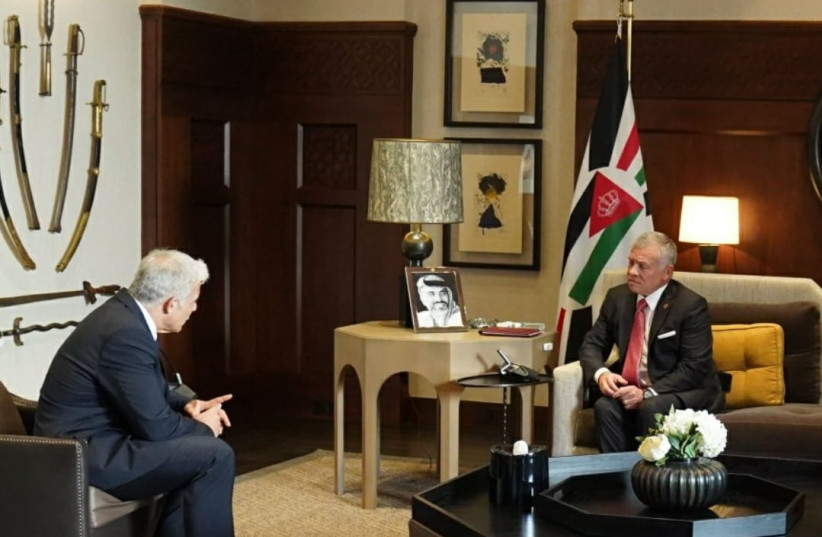Jordan’s King Abdullah pushed back at Israeli attempts to normalize ties with the Arab world prior to ending its conflict with the Palestinians by making a rare visit to Ramallah on Monday, the same day that Israel hosted four Arab foreign ministers in the Negev.
“His Majesty underlined that security and stability cannot be achieved in the region without reaching just and comprehensive peace on the basis of the two-state solution, which guarantees the establishment of an independent Palestinian state on the 4 June 1967 lines with East Jerusalem as its capital,” the Royal Hashemite Court said in a statement after the monarch’s meeting with Palestinian Authority President Mahmoud Abbas.
“The King emphasized the importance of giving the Palestinian cause the required international momentum, to avoid having it eclipsed by other recent crises,” the court stated. The international community often speaks of the importance of two states, but there is currently no peace process.
Abdullah and Abbas also discussed the importance of preventing an outbreak of violence next month, during the Passover, Easter and Ramadan holidays. Violence at that same time last year led to the outbreak of an 11-day Gaza war in May, known as Operation Guardian of the Walls.
Jordan, which made peace with Israel in 1994, opted not to attend the Negev Summit that included foreign ministers from the US and Egypt, which signed a peace treaty with the Jewish state in 1979. Foreign ministers from three of the four Abraham Accord countries that normalized ties with Israel in 2020 – the United Arab Emirates, Bahrain and Morocco – did participate in the summit.

The king's Ramallah visit had been planned prior to the announcement of the Negev Summit. The two simultaneous events provided contrasting images, one of Israeli Foreign Minister Yair Lapid with four regional dignitaries and the other of Palestinian Authority President Mahmoud Abbas with one neighboring leader. It gave the appearance of regional support tilting toward Israel and away from the Palestinians.
Abdullah, who last visited Ramallah in 2017, affirmed that his country would always stand with the Palestinians, stating “we are closest to each other and we are in the same boat.”
Jordan has a large Palestinian population, for whom the Israeli-Palestinian conflict is personal, and Amman has a special custodial relationship to Jerusalem’s Temple Mount, known to Muslims as al-Haram al-Sharif.
The king spoke with Abbas about “efforts to preserve the historic and legal status quo of Jerusalem, and safeguard its Islamic and Christian holy sites, under the Hashemite Custodianship,” the Hashemite Court said.
The two men also spoke about Israeli unilateral actions, such as settlement construction that both Abdullah and Abbas oppose.
The Hashemite monarch arrived in Ramallah with an entourage of dignitaries, including Crown Prince Al Hussein bin Abdullah II, Prime Minister Bisher Khasawneh, Deputy Prime Minister and Foreign Minister Ayman Safadi, Director of the Office of His Majesty Jafar Hassan, General Intelligence Department Director Maj.-Gen. Ahmad Husni and the head of Jordan’s Representative Office to Palestine Mohammad Abu Wandi.
Earlier in the day, PA Prime Minister Mohammad Shtayyeh spoke out against the Negev Summit, according to statements published by the Palestine News Agency WAFA.
“Arab normalization meetings without ending the Israeli occupation of Palestine are just an illusion, a mirage and a free reward for Israel,” he said.
“Israel is ignoring the causes of our people, half of whom are under occupation and the other half in refugee camps, in exile and the diaspora," Shtayyeh said. "Despite Israel’s attempts to ignore our rights, expand its colonial settlements, set up checkpoints, kill and arrest us, and destroy any chance of peace with us, we have never been more determined to confront this Israeli machine that is destroying our land, people, and sanctities.”
